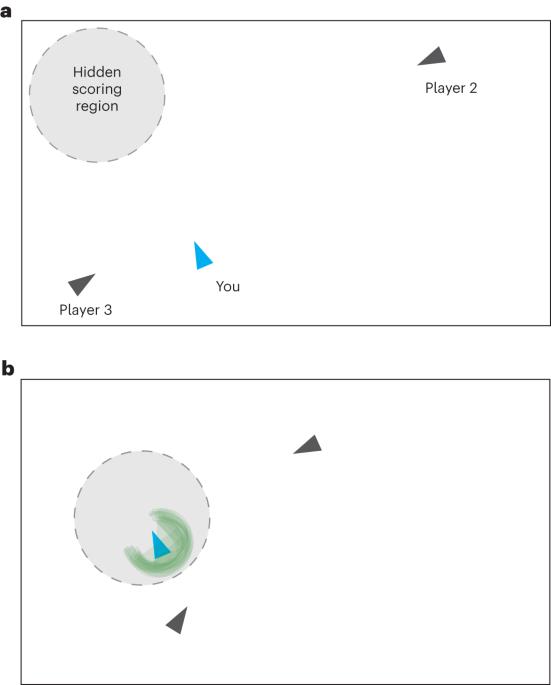当无法观察到奖励时,灵活的社会推理有助于有针对性的社会学习。
IF 21.4
1区 心理学
Q1 MULTIDISCIPLINARY SCIENCES
引用次数: 0
摘要
当个人能够从他人的成功中学习时,团队会更有效地协调。但获得这些知识并不总是那么容易,尤其是在现实世界中,成功是隐藏在公众视野之外的。我们认为,社会推理能力可能有助于弥合这一差距,使个人能够根据可观察的行为轨迹更新他们对他人潜在知识和成功的信念。我们在集体感知任务中对人类行为的三项研究中,将我们的社会推理模型与更简单的启发式方法进行了比较。实验1表明,作为组大小的函数,平均性能以比启发式模型预测的更高的速率提高。实验2引入了人工智能体来评估个体如何选择性地依赖社会信息。实验3将这些发现推广到更复杂的奖励景观中。总之,我们的研究结果深入了解了个体社会认知与集体行为灵活性之间的关系。本文章由计算机程序翻译,如有差异,请以英文原文为准。

Flexible social inference facilitates targeted social learning when rewards are not observable
Groups coordinate more effectively when individuals are able to learn from others’ successes. But acquiring such knowledge is not always easy, especially in real-world environments where success is hidden from public view. We suggest that social inference capacities may help bridge this gap, allowing individuals to update their beliefs about others’ underlying knowledge and success from observable trajectories of behaviour. We compared our social inference model against simpler heuristics in three studies of human behaviour in a collective-sensing task. Experiment 1 demonstrated that average performance improved as a function of group size at a rate greater than predicted by heuristic models. Experiment 2 introduced artificial agents to evaluate how individuals selectively rely on social information. Experiment 3 generalized these findings to a more complex reward landscape. Taken together, our findings provide insight into the relationship between individual social cognition and the flexibility of collective behaviour. Groups coordinate more effectively when individuals are able to learn from others’ successes. Hawkins et al. use a large-scale collective sensing paradigm to test how individual social inference abilities shape the emergent behaviour of human groups.
求助全文
通过发布文献求助,成功后即可免费获取论文全文。
去求助
来源期刊

Nature Human Behaviour
Psychology-Social Psychology
CiteScore
36.80
自引率
1.00%
发文量
227
期刊介绍:
Nature Human Behaviour is a journal that focuses on publishing research of outstanding significance into any aspect of human behavior.The research can cover various areas such as psychological, biological, and social bases of human behavior.It also includes the study of origins, development, and disorders related to human behavior.The primary aim of the journal is to increase the visibility of research in the field and enhance its societal reach and impact.
 求助内容:
求助内容: 应助结果提醒方式:
应助结果提醒方式:


